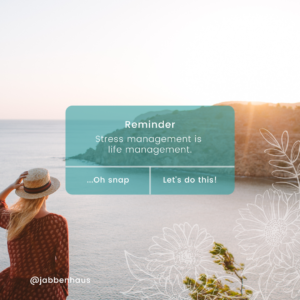How the Shitshow of 2020 is Causing Long-term Stress and What You Can Do About It
Calling 2020 “unprecedented” is a bit of an understatement at this point. The past 11 months has had more WTF moments than a Borat interview, and the seemingly constant barrage of anxiety-producing headlines is stressing me out!
The problem with all this stress—I mean, other than it sometimes makes me want to eat brownies, drink wine, and stay in bed—is that it means our body’s stress-response system is way too active. That can lead to an array of negative health effects that may derail our efforts to achieve strength and vitality.
What Is Stress and How Does It Work?
When your brain perceives a threat, it triggers your stress-response system, which includes releasing stress hormones like adrenaline and cortisol. It’s these hormones that cause some of the immediate physical symptoms of stress: sweaty palms, dry mouth, racing heartbeat.
Oddly enough, the logical part of your brain—the part responsible for things like planning and organizing—shuts down. Your emotions take over, and that throws your decision-making skills out the window. (This is one reason it’s so hard to say no to chocolate chip cookies when you’re stressed out!)

When Is Stress Bad?
Your body’s reactions to stress aren’t bad in small doses, but people who have chronic stress are overexposed to stress hormones, which can lead to:
- Depression and anxiety
- Weight gain
- Sleep disruptions
- Memory problems
- Chronic inflammation
- Heart disease
- Sexual dysfunction
- Gastrointestinal problems
- Muscle tissue damage
- Weakened immune system
Sounds terrible, doesn’t it? Actually, some of it sounds a lot like the things your body can go through as you age, and there may be a good reason for that. Several studies show that chronic stress may increase cellular aging, according to an article in Psychology Today. Essentially, our chromosomes have “protective caps” called telomeres. Telomeres shrink as part of a natural process, but studies show stressful events speed this up. Moreover, shorten telomeres are associated with some chronic diseases and premature death.
Signs You’re Dealing With Chronic Stress

We can point to situations that definitely seem stressful—major life changes, traumatic events, and the like—but not everyone experiences these stressors the same way. Your genetic makeup, early experiences, and even just your attitude influence how stress affects you.
The key then to managing chronic stress is identifying your reactions to stressors. If you’re in an emotional situation that you have little control over and that goes on for weeks or months, then you want to pay attention to:
- Physical symptoms: Examples include upset stomach, multiple colds or infections, insomnia, chest pain, increased heart rate, and decreased sex drive.
- Emotional symptoms: You might notice that you get angry or upset easily or that you’re unable to relax.
- Behavioral symptoms: Take note of any increase in drug or alcohol use or changes in appetite.
The fact is we usually know we’re under stress, but we don’t think about how it impacts our body. Once you make a connection between the two, you can stop beating yourself up for not acting how you hope and start making changes to help you deal.
Stress Management Tips
Okay, so this part is going to blow your mind. Stress management is life management! It’s everything you want to do to live a healthy life, such as:
 Exercising: Aerobic exercise increases oxygen circulations and releases endorphins, the hormones that help you feel good—and that’s just the immediate benefit. Keep up your exercise routine and you can see improved heart function and mental acuity as well as increased energy.
Exercising: Aerobic exercise increases oxygen circulations and releases endorphins, the hormones that help you feel good—and that’s just the immediate benefit. Keep up your exercise routine and you can see improved heart function and mental acuity as well as increased energy.
- Eating a healthy diet: Look for foods that boost your immune system, cut your stress hormones, and regulate your blood sugar: complex carbs like oatmeal and whole grains, citrus fruits, and fish rich in Omega-3 fatty acids like tuna and salmon.
- Practicing mindfulness: I get it. Meditation isn’t for everyone, but that’s not the only way to be mindful. Yoga and other breathing exercises can help you relax and put you in touch with your stress response so you can choose how to react rather than just react.
- Nurturing relationships: Social isolation raises your cortisol levels, exacerbating the effects of chronic stress. Even if the pandemic restricts your face-to-face interactions, you can use technology to stay connected. Sick of Zoom happy hours? Go low-tech with a phone call or a letter.
- Getting enough sleep: Insomnia may be one of the symptoms of chronic stress, but you can make sleep your best friend with these tips.
The trick is that these are harder to do when you’re stressed out. Remember how I said your logical brain sort of relinquishes control when faced with a threat? This is why it’s so important to know what your personal reaction to stress is. That way, you can identify what’s happening and make a conscious choice to treat yourself well.
Wishing you all the best in health,
Jenn | Your FitBodyPhatLife Coordinator





![A Fresh Take on Caring for Yourself [Podcast]](https://jennabbenhaus.com/wp-content/uploads/2022/09/FOCTA-Ep85-URL-768x768.jpg)

